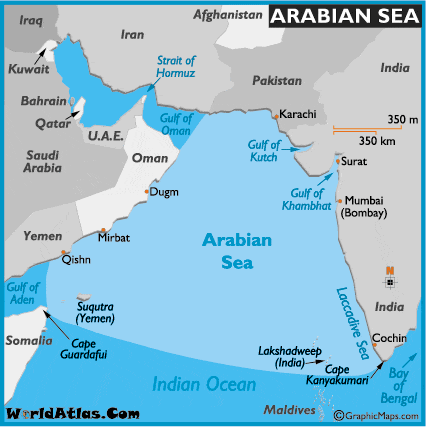Rare August Cyclone Asna Surprises Indian Ocean
Why in the news?
Cyclone Asna, an unusual August storm, emerged from a land depression over the Arabian Sea. It marks the first August cyclone in the north Indian Ocean since 1981.
About the Unusual Cyclones in the Arabian Sea:
- Cyclone Seasons: The north Indian Ocean has two cyclone seasons (pre-monsoon and post-monsoon) due to distinct monsoonal wind patterns and sea surface temperatures. Other regions have only one cyclone season.
- Cyclone Activity: Despite favourable conditions like warm waters, the Arabian Sea has fewer cyclones compared to the Bay of Bengal. Factors such as vertical wind shear and cooler temperatures contribute to this rarity.
- Climate Change Impact: Rapid warming of the Indian Ocean, influenced by heat from the Pacific and Southern Oceans, affects cyclogenesis. Climate change exacerbates these effects, increasing unusual cyclone activity.
Asna: A Rare August Cyclone
- Cyclone Asna: Asna, a rare cyclone forming in August, is the first in the north Indian Ocean since 1981. It originated from a land-based depression that transitioned to the warm Arabian Sea.
- Unusual Development: The cyclone grew unusually strong over land, drawing energy from the Arabian Sea.
- It caused significant damage, including fatalities and property destruction.
- Context: The cyclone’s formation highlights unpredictable weather patterns influenced by global warming, El Niño, and unusual monsoon dynamics.
What is an Unusual Cyclone?
- Unexpected Intensification: Cyclone Asna formed in the North Arabian Sea, an area typically too cold during monsoon for cyclonic storms due to ocean upwelling.
- Surprise Factor: Historically, the region’s cold waters prevent storm intensification; this event challenges previous meteorological understanding.
- Climate Change Influence: Warming of the Arabian Sea due to global warming is altering traditional weather patterns, necessitating updates to meteorological textbooks and adaptation strategies.
Cyclone Asna: Uncommon Formation
- Unusual Formation: Land-born cyclones are rare due to typically insufficient moisture and heat over land.
- Contributing Factors: Cyclone Asna formed due to unique atmospheric dynamics, including a low-pressure system and interaction with the monsoon trough.
- Implications: Its occurrence highlights challenges in weather forecasting and disaster preparedness, emphasising the need for updated models to handle such rare events.
- Historical Context: Asna is the first cyclonic storm in the Arabian Sea in August since 1976.
- Naming: The name “Asna,” meaning “the one to be acknowledged or praised,” was given by Pakistan.
- Historical Frequency: From 1891 to 2023, only three cyclonic storms occurred in August in the Arabian Sea: 1944, 1964, and 1976.




